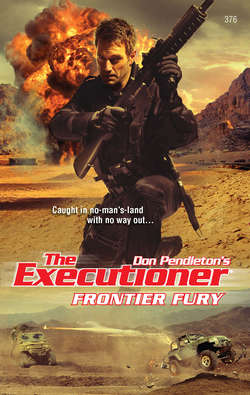Читать книгу Frontier Fury - Don Pendleton - Страница 7
Prologue
ОглавлениеNangarhar Province, Afghanistan:
November 22, 2001
The Americans were coming—finally.
They had begun their long-distance assault six weeks before—Tomahawk cruise missiles fired from ships in the Arabian Sea; carpet-bombing from their B-1 Lancers, B-2 Spirits and B-52 Superfortresses—while tribal militians paid and organized by the Central Intelligence Agency rallied to attack the Taliban and warriors of The Base. American Marines and Special Forces had been fighting in the streets of Kandahar and Tora Bora, but they had not ventured far into the eastern countryside.
Until today.
Akram Ben Abd al-Bari heard the helicopters prowling over rocky mountaintops and knew that they had come for him. He couldn’t tell their model from a distance, but it made no difference. Where once the Soviets had hunted him with Hinds, now the Great Satan searched for him with AH-64 Apaches, Lynx, or Bell AH-1 gunships. They brought bombs and rockets, .50-caliber machine guns, 20 mm cannons, laser sights and infrared devices.
It was all the same.
The Communists had never found him, nor would the Crusaders.
It was time to flee.
Akram Ben Abd al-Bari saw no shame in running from his enemies. They were superior in numbers and technology, awash in money sucked from oil fields in his native homeland, willing to spend billions of their dollars in pursuit of what they loosely termed “justice.”
He had imposed justice upon them—or, at least, a fair down payment on the tab they owed to Allah—with a daring strike against their homeland. Now, he would retreat and find another place to hide until the next strike was delivered, and then the one after that.
War everlasting, to the bitter end.
Ra’id Ibn Rashad approached him without fear, as an old friend and valued comrade. “It is time,” he said.
Al-Bari nodded, sweeping one more glance around the cave that he had occupied since the Americans first struck, back on October 7. He would not miss the bare walls of stone or the floor that always managed to be damp even though they were surrounded by a desert.
He could settle anywhere, command his global army from a hut or an urban high-rise, issue orders from a tent or even bunker buried in the middle of the Gobi Desert, if need be.
Allah was everywhere, and he would have his victory.
“I’m ready,” al-Bari said to his oldest and most trusted friend.
“Come, then,” Rashad replied. He wore a Soviet assault rifle over one shoulder, offering its twin to al-Bari with his right hand.
Al-Bari took the rifle, smiled and nodded.
More than two decades had elapsed since he’d last fired a shot in anger, and actually killed another human being with his own two hands. The Soviets had left Afghanistan, defeated, during February 1989. Rather than pause and celebrate that victory, al-Bari moved on to face the next challenge as a commander who directed troops and martyrs in pursuit of Islam’s enemies.
It struck him that he had existed in a constant state of war since he was twenty-two years old—more than four decades now—and that unless Allah intervened with some apocalyptic stroke against his earthly foes, al-Bari would be fighting on until the day he died.
So be it.
He had known the risks when he began, had understood that there could be no turning back.
Distant explosions marked the point where pilots had discovered targets, either Taliban or innocent civilians. They would find no Afghan regulars to shoot at in the mountains hereabouts.
Vehicles waited on the unpaved mountain road below al-Bari’s cave. Their small convoy would hasten to the border, through the same Khyber Pass that Alexander the Great had used to invade the Indus Valley in 326 BC. Even then, it was well-known to traders, fugitives and bandits.
It would serve al-Bari well.
And he would live to fight again.
The infidels in Washington and London who believed that they had heard the last of him were wrong. Dead wrong.
Akram Ben Abd al-Bari was not beaten yet.
His war endured.
